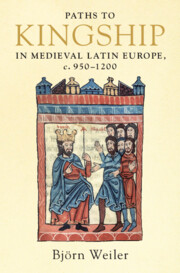Book contents
- Paths to Kingship in Medieval Latin Europe, c. 950–1200
- Paths to Kingship in Medieval Latin Europe, c. 950–1200
- Copyright page
- Contents
- Maps
- Acknowledgements
- Abbreviations
- Timeline
- Introduction
- Part I Foundations
- Part II Creating Kingship
- Part III Succession
- Part IV Election
- Part V Inauguration
- Select Reading
- Index
Introduction
Published online by Cambridge University Press: 24 September 2021
- Paths to Kingship in Medieval Latin Europe, c. 950–1200
- Paths to Kingship in Medieval Latin Europe, c. 950–1200
- Copyright page
- Contents
- Maps
- Acknowledgements
- Abbreviations
- Timeline
- Introduction
- Part I Foundations
- Part II Creating Kingship
- Part III Succession
- Part IV Election
- Part V Inauguration
- Select Reading
- Index
Summary
The introduction sets the scene. It places the book in a broader historiographical context, and outlines the key research questions underpinning it. It introduces key concepts, such as political culture, and outlines the range of sources used: chronicles, annals, saints' lives, liturgical texts, letters and charters. It draws attention to rapid changes in the political geography of medieval Latin Europe, and the self-perception of its inhabitants in relation to Byzantium and the Islamic world. The introduction also marks out what is new and different about the book: its focus not on the ruler, but on his subjects; their role in choosing a king, in defining the framework of rules for the successful exercise of the king’s office; and the extent to which they could also frame the practice of royal lordship. A defining theme is that these issues can best be explored by adopting a transeuropean perspective, which has not so far been attempted.
- Type
- Chapter
- Information
- Publisher: Cambridge University PressPrint publication year: 2021

